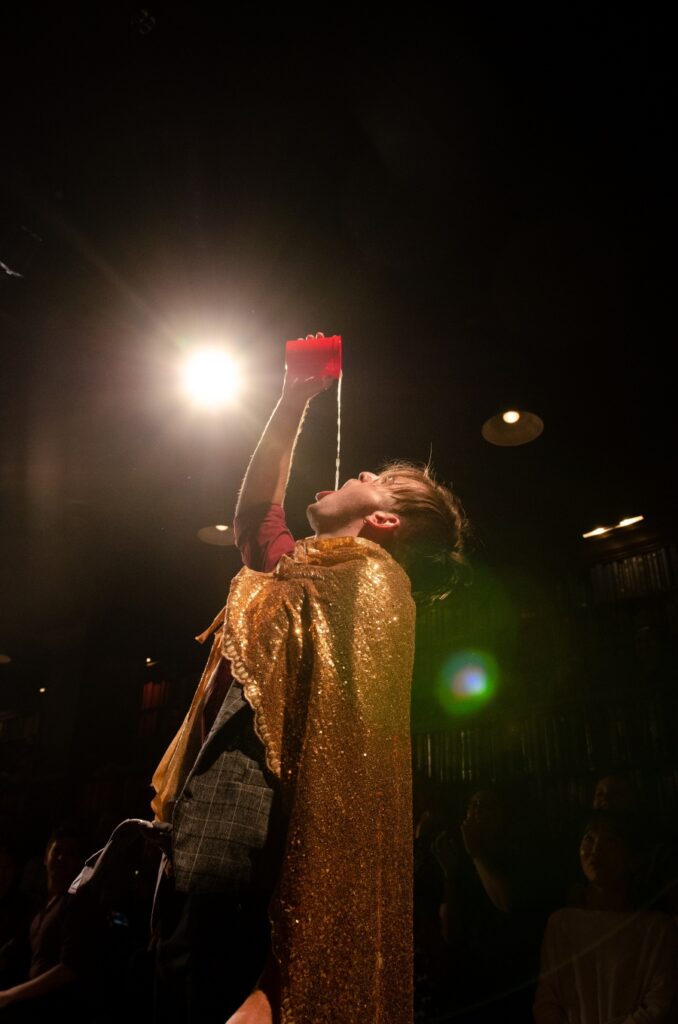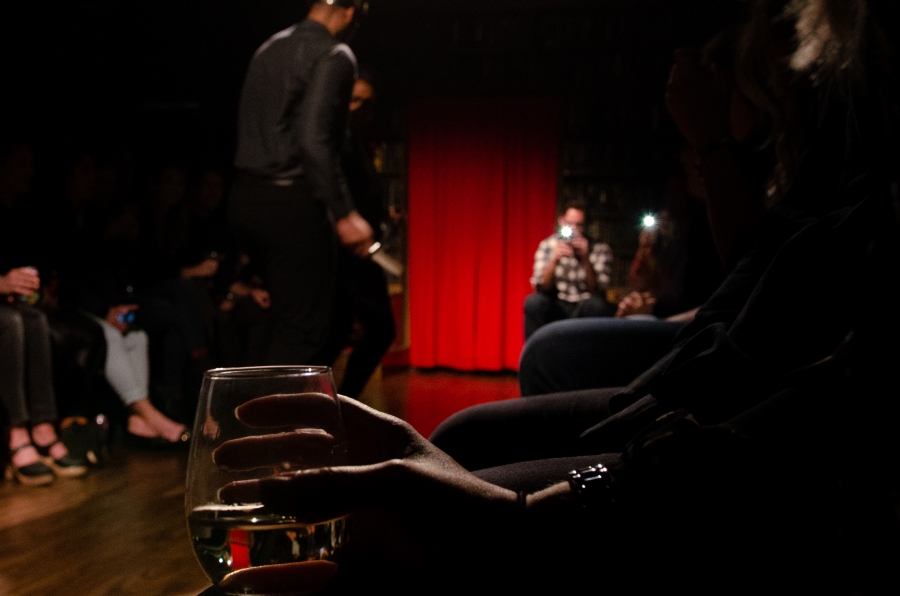Chicago is no stranger to worker’s unions. The city’s Haymarket Riot of 1886 erupted amid a national call for the eight-hour workday, and the Windy City was home to the first all-Black labor union in America, the Brotherhood of Sleeping Car Porters, in 1925. So it should come as no surprise that Chicago’s branch of Drunk Shakespeare, a popular party theatre brand with outposts all over the U.S., was the first to call for unionizing.
“We have had so many conversations with our upper management about the issues we are trying to fix, and once it became clear that they would not budge on these issues, unionizing became the obvious choice,” said Ella Fent, Drunk Shakespeare United union leader and Drunk Shakespeare Chicago server. “In late April, we had an unsuccessful meeting with our upper management, and it became clear that we needed external support. So I reached out to EWOC (Emergency Workplace Organizing Committee), and they gave us a fantastic start to our unionizing process.”
Drunk Shakespeare has been in Chicago since 2019. Before it branched into various troupes around the country, the show began in New York as a 90-minute show by Scott Griffin and David Hudson in 2014. The concept is that the five-person cast attempts to perform a truncated Shakespearean production after one actor downs five shots of alcohol, with the show rotating which actor will get plastered in a schedule featuring at least eight performances per week. Chicago wasn’t the first Drunk Shakespeare off-shoot production, but its move to unionize has sparked a push that has caught on in other branches across the country.

The nature of Drunk Shakespeare’s working conditions, which includes bar service for audience members to enjoy from their seats, can make it a tricky one to navigate without proper oversight. Issues that continually arose were unpleasant work environments, lack of pay raises, and random cutting of hours. There were also no official protocols for last-minute emergencies, according to Fent. Chicago performer Bailey Savage explained that this hybrid sort-of-bar-and-sort-of theatre model made unionizing even more important.
“There aren’t clear boundaries or typical workplace policies,” Savage explained. “We are unique, and we could not operate without the whole team—actors [and] servers. But we didn’t have the type of support we needed to operate to the best of our ability in either capacity.“
Top of mind for Savage was a lack of communication between management and the team around expectations, policies, and organizational changes, because not everyone was on the same page.
”At one point last year, Chicago employees sent a collective letter with concerns to our higher-ups that went unanswered for months,” Savage said. When the company finally had a meeting, the staff and cast sent over an agenda and prepared talking points. The focus was on hiring an assistant manager, which is only now being done by the management. Griffin, the show’s CEO, “immediately turned down this possibility.” When the staff asked if they could “share the reasons why we were proposing this position,” Griffin “expressed frustration that he kept having to repeat ‘no.’”
“Personally, this was the thing that pushed me to want to unionize,” Savage continued. “This is a growing company—we all know that, and we all have patience for things that are road bumps. But when we are trying to directly address the issues that we face, and we have to ‘gear ourselves up to fight,’ it is absolutely exhausting and takes a major toll on all of us.”

When Actors’ Equity Association announced the unionization in May, they explained that they would act as Drunk Shakespeare Chicago’s bargaining representative. Working with Equity and EWOC has helped the unionization process for Drunk Shakespeare Chicago move along at a clip, Fent said. With Equity’s help, the folks at Drunk Shakespeare Chicago can bargain for new contracts, Fent explained. Those contracts will include pay increases for everyone and new policies to improve working conditions.
“Drunk Shakespeare United gives us a chance to be heard by our employers, and Equity is giving us the support we need to [ensure] our union is effective,” Fent said. “I personally have never bargained a new contract before, and as far as I know, neither has anyone else at Drunk Shakespeare Chicago. Equity has the experience and resources we did not have access to before. They have already helped so much in reaching out to the other cities; I know I personally had conversations with actors at different locations who were apprehensive of our union until they heard we had Equity’s representation.”
Formed in 1913, Equity currently represents over 51,000 professional actors and stage managers. The Drunk Shakespeare Chicago union would not just represent the performers and crew, however, but the entire staff, including servers and bartenders. Union leaders were able to get 100 percent of the Chicago cast and crew to sign their authorization cards, which might not have happened if everyone’s concerns had not been addressed upfront, Fent added.
“It’s thrilling to be a labor leader at this moment in which arts workers across the country, like our colleagues in other industries, are claiming their power,” said Equity president Kate Shindle in a press release. “That’s exactly what the members of Drunk Shakespeare United are doing. These actors and stage managers, servers and bartenders have banded together to unionize in order to achieve a fairer, safer workplace, and Equity is eager to support their efforts. I hope that companies of other shows—who might not have realized that they too can have a unionized workplace—will be inspired by Drunk Shakespeare United’s decision to stand together and say, ‘We deserve better.’”
Fent explained that excluding any staff at Drunk Shakespeare Chicago from the union was out of the question. Including everyone under the union initially made representatives a little hesitant about reaching out to Equity, but they were pleasantly surprised when the organization welcomed the inclusion with open arms.
“The fact that they were willing to extend the Equity protections to our crew was a huge deal to us, and we would not have been able to unionize unless everyone felt protected,” Fent said. “Even before we unionized, the cast was constantly checking in on the servers and bartenders, and they were willing to strike in February for server-specific raises to match the actor raises offered by the company in December.”
As reported by the Chicago Reader, Drunk Shakespeare Chicago’s employer, Meme Juice Productions IL LLC, recognized the unionization filing within days. That is fast for such a move, considering that the instructors at Second City have been trying to negotiate a union contract through the Association of International Comedy Educators (AICE) for over two years. Meme Juice could not be reached for comment.

That almost instantaneous recognition has also caught fire across other branches of Drunk Shakespeare. There are five groups of Drunk Shakespeare troupes nationwide: Chicago, New York City, Phoenix, D.C., and Houston. So far two other troupes, in Phoenix and D.C., have joined the march toward a united front. Drunk Shakespeare D.C. ensemble member and union representative Kit Krull said the D.C. branch had been considering coming together for a few months.
“Back in April, D.C. had a reckoning that led to us approaching management about structural and equity issues that accumulated over the year we’d been open,” they explained. “We weren’t using the word ‘union,’ but I believe we were beginning to think along those lines. When we heard that Chicago had unionized, we knew that we had to get in contact with them as soon as possible.”

Krull explained that during the first weekend in April, the Drunk Shakespeare D.C. team suffered a company-wide COVID-19 outbreak, and half of the staff were out sick. Instead of canceling the shows, they said, upper management pushed the few remaining company members to do back-to-back sold-out shows that Friday. Both managers were out sick, so no management was there that night, and actors were tasked with operating both the light and sound boards despite having no training on either, since no stage manager was present.
“Actors would run onstage to say a line, run off to support stage-management tasks, and then run around to deliver or reset a prop before [returning onstage],” Krull described. “We were fortunate that there were no incidents with inebriated patrons on this particular night, but the staff on duty did not feel supported, and it was a catalyzing factor in our unionization.”
Brass Jar Productions, the employer behind Drunk Shakespeare in Phoenix and D.C., could not be reached for comment.
Other issues that D.C. faced were similar to those voiced in Chicago, like employees needing union support for scheduling and payroll issues. Drunk Shakespeare D.C. also struggled with protocols for adding shows and using swing performers. As was the case in Chicago, the D.C. company unanimously came together to unionize, which surprised those involved with the union. Krull called it a “motivating and positive experience.” Not only are the different branches coming together and getting to know each other, Krull added, but they’re also able to work together over issues they now realize were not isolated.
“I think the biggest surprise has been the amount of momentum we’ve been able to pick up in a short amount of time, and how unanimous the decision has been across each company,” Krull said. “I think it speaks to how much respect and care there is among the workers of Drunk Shakespeare.”
In Phoenix, performer and union representative Clara Kundin credited the Chicago branch’s unionization with spurring their move to join the union. She explained that overcoming some of the same issues was part of the motivation, though health insurance access was also a considerable part of the decision. She also noted that the path to Equity membership is huge for some cast members who wanted to go that route at some point anyway, including Kundin herself.
This process has been vital for those involved with Drunk Shakespeare. As Fent expressed, the union’s role as a safety net of sorts makes it easier to go to work day by day.
“I am not worried about having hours cut on a whim; I am not worried about the idea of staying at this job for [three] years without ever getting a raise,” Fent said. “The ideal future of Drunk Shakespeare United is to create a work atmosphere that people enjoy coming into work every day.”
Drunk Shakespeare union reps hope all five troupes nationwide will soon have unions so they can all have the benefits and safety unionization offers and the security to keep doing what they enjoy.
“Talking with the members of other cities has been such an exciting and informative part of this process,” Fent said. “As soon as Chicago went public, we instantly got messages of support from current and former cast and crew at other locations, and people immediately started sharing stories about their workplaces. With [three out of five] locations unionized, I feel confident knowing that we have the strength to make effective, positive changes to our workplace.”
Amanda Finn (she/her) is a queer freelance journalist based in Chicago. Her work has been featured in publications such as the Chicago Reader, Yahoo, HuffPo, ViaTravelers, and more. She was also one of the three locals who contributed to the book Chicago Like a Local with DK Eyewitness.


